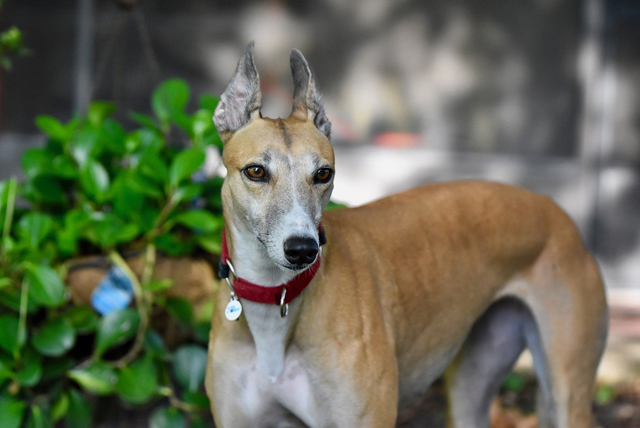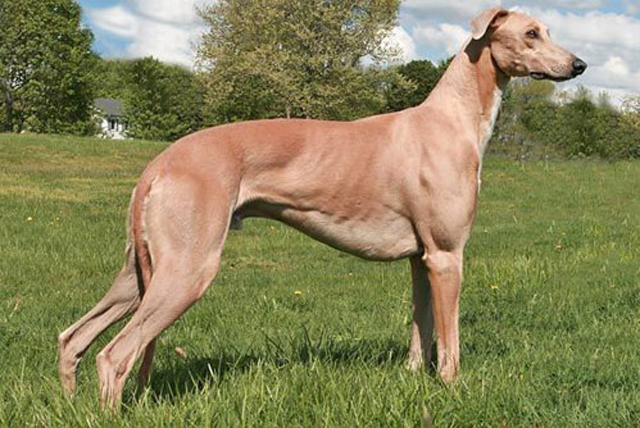iHeartDogs is reader-supported. When you buy via links on our site, we may earn an affiliate commission at no extra cost to you.

Of course, the Greyhound is known for its speed, but these hounds have been loyal companions since they served the Egyptian Pharaohs 5,000 years ago. Despite their intimidatingly athletic physique, the Greyhound is a sweet and gentle dog. Though they love to be active, they also spend a lot of time lying beside their people on the couch.
As great as this breed is, Greyhounds are prone to certain medical conditions. While several of these health issues can be expensive to treat, you may be able to cover the high costs if you invest in pet insurance for your dog early.
It’s easy to feel overwhelmed when it comes to choosing the right pet insurance plan for your beloved Greyhound. This guide will help you select a plan that covers everything you want it to, so you can be there for your dog when they need you most.
Compare The Top 9 Pet Insurance Plans for Your Greyhound Using our Free No-Obligation Quote Tool below
The simplest way to compare pet insurance prices is to use our tool below. The comparison tool will show you quotes from the top 9 pet insurance carriers, including Trupanion, Pets Best, Lemonade, ManyPets, FIGO, HealthyPaws, Prudent Pet, Spot, and Embrace pet insurance.
[HLM_Insurance_Widget placement_name=‘GreyhoundArticle’ placement_id=‘1’ campaign=‘GreyhoundArticle’]
How Much Does Pet Insurance for a Greyhound Cost?
Below are some sample pet insurance plans for a 1-year-old male Greyhound using the zip code 75001 (Texas) as an example.
- Pets Best – $46.01 per month
- Embrace – $51.24 per month
- Healthy Paws – $42.20 per month
- ManyPets – $42.07 per month
Ultimately, your plan’s premium will depend on several factors, including your dog’s age, size, and breed, as well as where you live. You also want to know what type of coverage your plan has and if it will help with Greyhound-specific health problems. Let’s get more into those medical conditions and how much you can expect to pay to treat them.
Common Health Problems Associated With Greyhounds
Gastric Torsion (“Bloat”) in Greyhounds
Gastric Torsion (aka “bloat”) occurs when your dog’s stomach fills too rapidly with gas, food, or fluid. Bloat is a sudden, life-threatening condition where the stomach can twist, blocking the organ’s entrance and exit. It can even obstruct blood flow, which is a medical emergency.
Early diagnosis and treatment are essential when it comes to gastric torsion. Preventative measures, like regular exercise, proper diet, and not eating or drinking too quickly help as well.
If you notice any of these warning signs, you should take your Greyhound to the vet right away:
- Swollen belly
- Rapid heartbeat
- Difficulty breathing
- Collapse
Von Willebrand Disease (vWD) in Greyhounds
Von Willebrand Disease (vWD) is an inherited bleeding disorder where a vital protein involved in blood clotting is absent. Some dogs carry the trait without experiencing symptoms. Others may suffer spontaneous bleeding from the nose, mouth, or digestive or urinary tracts. Teething or infections may also cause bleeding.
Dogs with this condition should not take drugs that affect normal blood clotting. There is no cure, but the condition can be managed to reduce the likelihood of severe complications.
Osteosarcoma in Greyhounds
Also known as bone cancer, osteosarcoma is the leading cause of death in Greyhounds. These tumors can develop anywhere along their skeleton but most commonly appear above the shoulders and on limbs.
While dogs can develop osteosarcoma at any age, most diagnoses occur around age 8. Surgery can save your dog’s life, but unfortunately, it’s not guaranteed to.
Racing Related Injuries in Greyhounds
Given Greyhounds’ speed, they’re the breed most commonly used as racing dogs. Dog racing is currently illegal in 42 U.S. states, which still feels insufficient given the injuries and health conditions these dogs frequently suffer from.
According to Grey2kUSA, from 2010 through 2021, 12,951 greyhound injuries have been documented. The most commonly reported injuries are broken legs, but others include head trauma, electrocution, and broken backs. Some retired racing dogs will have cracked paw pads or broken nails, which can make walking, let alone running, very uncomfortable. Others, due to being kept in unsanitary and inhumane conditions, suffer from dental decay, parasites, and fleas or ticks.
The issue is not so much that a Greyhound doesn’t like to run or running alone is bad for them. It’s more about the way racing dogs are mistreated. Many retired racing dogs rescued from these institutions need homes and patient adopters!
Typical Costs Of Treating Health Issues In Greyhounds and How Pet Insurance Can Help
If left untreated, many of the health conditions listed above can result in long-term consequences and even require surgery, which ultimately makes them more expensive to manage. Selecting a pet insurance plan suited for your Greyhound’s particular needs might save you tons of money on medical costs.
Here are just some sample veterinary expenses for Greyhounds:
- Bloat Costs: If your dog’s stomach has twisted, it will probably need emergency surgery to untwist it. The average cost of treating a bloat case with surgery runs between $2,000 and $5,000. If there are complications, the cost could be even higher. Pet insurance with emergency coverage can literally be life-saving in this case.
- Von Willebrand Disease Costs: While there’s sadly no cure for this disease, dogs with vWD can live perfectly normal lives with management and avoidance of risky activities. If your dog has severe bleeding due to an injury, it may require a blood transfusion. This typically costs $100 to $300 per unit.
- Osteosarcoma Costs: X-rays will definitely be required to diagnose the condition, and urinalysis can determine if the cancer has spread. As I mentioned, surgery is only somewhat successful at saving an affected dog’s life. Some dogs will need limbs amputated. Because these tumors are so aggressive, your dog may also need chemotherapy to treat metastasis. In other words: this is a very expensive medical condition (meaning costs extending past $10,000.)
- Racing Injury Costs: Given the wide variety of health issues a racing dog can suffer from, the costs vary just as much. Repairing broken bones costs anywhere from $400 to $3,000 depending on the severity of the fracture. That doesn’t include the hundreds of dollars X-rays cost. Dental disease is another pricey condition, especially if diagnosed late. Since they often require anesthesia, canine teeth cleaning procedures average between $500 and $1,000. You’ll end up paying even more for oral surgery if your dog needs decayed teeth removed.
Knowing the signs and symptoms of these conditions common in Greyhounds can help you catch them early, saving your dog and your money. When in doubt, take your pup to the vet to have them diagnosed.
What Is Pet Health Insurance And Why Do I Need It For My Greyhound?
Pet health insurance works very similarly to human health insurance. Your policy quote will range in monthly price, depending on your dog’s breed, age, and where you live. Typically, you’ll spend around $15-$103 per month as a pet parent.
Pet insurance is mainly about peace of mind, knowing you won’t be totally overwhelmed in case of an emergency. Enrolling even when your dog is young and healthy will ensure you have plenty of coverage when they need expensive medical care later. If you choose a plan more suited to your dog’s particular breed, you’ll be more prepared when something happens later on in their life.

Some plans cover accidents and illnesses, while others only cover accidents. Certain plans do cover breed-specific illnesses, and others do not. It all depends on what type of coverage you choose. With our free pet insurance comparison tool, you can get quotes from multiple insurance companies with no obligation to commit.
[HLM_Insurance_Widget placement_name=‘GreyhoundArticle’ placement_id=‘2’ campaign=‘GreyhoundArticle’]
Whatever plan you choose, you’ll feel better knowing you can take care of your dog when they need you most. Plus, you won’t have to suddenly shell out thousands of dollars. Learn more about how pet insurance works here.
Pet Insurance Carrier Comparisons
- 9 Best Pet Insurance Plans for Dogs
- Best Cheap Pet Insurance
- Trupanion Vs. Pets Best Pet Insurance
- Trupanion Vs. Lemonade Pet Insurance
- HealthyPaws Vs. Embrace Pet Insurance
- HealthyPaws Vs. Trupanion Pet Insurance
- Embrace Vs. Trupanion Pet Insurance
- Embrace Vs. Lemonade Pet Insurance
- Trupanion Vs. FIGO Pet Insurance
- Prudent Pet Vs. Trupanion Pet Insurance
- Embrace Vs. ManyPets Pet Insurance
- Embrace Vs. FIGO Pet Insurance
- Prudent Pet Vs. Embrace Pet Insurance
- HealthyPaws Vs. ManyPets Pet Insurance
- HealthyPaws Vs. FIGO Pet Insurance
- Prudent Pet Vs. HealthyPaws Pet Insurance
- HealthyPaws Vs. Lemonade Pet Insurance
- Pets Best Vs. ManyPets Pet Insurance
- Pets Best Vs. FIGO Pet Insurance
- Prudent Pet Vs. ManyPets Pet Insurance
- Prudent Pet Vs. Pets Best Pet Insurance
- Embrace Vs. Pets Best Insurance
- HealthyPaws Vs. Pets Best Pet Insurance
- ManyPets Vs. Lemonade Pet Insurance
- Lemonade Vs. FIGO Pet Insurance
- Trupanion Vs. ManyPets Pet Insurance
- ManyPets Vs. FIGO Pet Insurance
- Lemonade Vs. Pets Best Pet Insurance
- Prudent Pet Vs. Lemonade Pet Insurance
- Prudent Pet Vs. FIGO Pet Insurance
Breed Pet Insurance
- Pet insurance for Akitas
- Pet insurance for Alaskan Malamutes
- Pet insurance for American English Coonhounds
- Pet insurance for American Staffordshire Terriers
- Pet insurance for Australian Cattle Dogs
- Pet insurance for Australian Shepherds
- Pet insurance for Basset Hounds
- Pet insurance for Beagles
- Pet insurance for Bernese Mountain Dog
- Pet insurance for Bichon Frises
- Pet insurance for Bloodhounds
- Pet insurance for Border Collies
- Pet insurance for Boston Terriers
- Pet insurance for Boxers
- Pet insurance for Bulldogs
- Pet insurance for Bullmastiffs
- Pet insurance for Bull Terriers
- Pet insurance for Cane Corsos
- Pet insurance for Cavaliers
- Pet insurance for Chesapeake Bay Retrievers
- Pet insurance for Chihuahuas
- Pet insurance for Chinese Crested Dogs
- Pet insurance for Chow Chows
- Pet insurance for Cocker Spaniels
- Pet insurance for Collies
- Pet insurance for Corgis
- Pet insurance for Dachshunds
- Pet insurance for Dobermans
- Pet insurance for Dogue De Bordeaux
- Pet insurance for English Springer Spaniels
- Pet insurance for French Bulldogs
- Pet insurance for German Shepherds
- Pet insurance for German Shorthaired Pointers
- Pet insurance for Goldendoodles
- Pet insurance for Golden Retrievers
- Pet insurance for Greyhounds
- Pet insurance for Great Danes
- Pet insurance for Great Pyrenees
- Pet insurance for Havanese
- Pet insurance for Huskies
- Pet insurance for Jack Russells
- Pet insurance for Labrador Retrievers
- Pet insurance for Labradoodles
- Pet insurance for Lhasa Apsos
- Pet insurance for Maltese
- Pet insurance for Mastiffs
- Pet insurance for Miniature Pinschers
- Pet insurance for Mixed Breeds (small)
- Pet insurance for Mixed Breeds (medium)
- Pet insurance for Mutts
- Pet insurance for Newfoundlands
- Pet insurance for Old English Sheepdogs
- Pet insurance for Papillons
- Pet insurance for Pekingese
- Pet insurance for Pit Bulls
- Pet insurance for Pomeranians
- Pet insurance for Poodles
- Pet insurance for Pugs
- Pet insurance for Rhodesian Ridgebacks
- Pet insurance for Rottweilers
- Pet insurance for Saint Bernards
- Pet insurance for Samoyeds
- Pet insurance for Schnauzers
- Pet insurance for Shar-Peis
- Pet insurance for Shelties
- Pet insurance for Shiba Inus
- Pet insurance for Shih Tzu
- Pet insurance for Staffordshire Bull Terrier
- Pet insurance for Vizslas
- Pet insurance for Weimaraners
- Pet insurance for Westies
- Pet insurance for Whippets
- Pet insurance for Yorkies
Pet Insurance by City
- Pet Insurance in San Diego
- Chicago Pet Insurance
- New York City Pet Insurance
- Pet Insurance in Seattle
- Pet Insurance in Los Angeles
- Pet Insurance in Austin
- Pet Insurance in San Antonio
- Pet Insurance in Miami
- Pet Insurance in Philadelphia
- Pet Insurance in Sacramento
- Pet Insurance in Orlando
- Pet Insurance in San Francisco
- Pet Insurance in Houston
- Pet Insurance in Dallas
- Pet Insurance in Tampa
- Pet Insurance in Pittsburgh
Pet Insurance by State
- Pet Insurance in California
- Pet Insurance in Texas
- Pet Insurance in Florida
- Pet Insurance in Pennsylvania
- Pet Insurance in Washington State
- Best Pet Insurance in Michigan
- State of Delaware Pet Insurance
- Pet Insurance in NC
- Pet Insurance in NJ
- Pet Insurance in Colorado
- Pet Insurance in Ohio
- Pet Insurance in Oregon
- Pet Insurance in Indiana
- Pet Insurance in Oklahoma
- Pet Insurance in Utah
- Pet Insurance in New York
- Pet Insurance in Massachusetts
- Pet Insurance in Arizona
- Pet Insurance in Minnesota
- Pet Insurance in Connecticut
- Pet Insurance in Wisconsin
- Pet Insurance in Hawaii
- Pet Insurance in Iowa
- Pet Insurance in New Hampshire
- Pet Insurance in Alabama
- Pet Insurance in Maine
- Pet Insurance in Maryland
- Pet Insurance in Rhode Island
- Pet Insurance in Arkansas
- Pet Insurance in Illinois
- Pet Insurance in Nebraska
- Pet Insurance in Alaska
- Pet Insurance in Louisiana
- Pet Insurance in South Carolina
- Pet Insurance in Vermont
- Pet Insurance in Georgia

 Toledo, United States.
Toledo, United States.